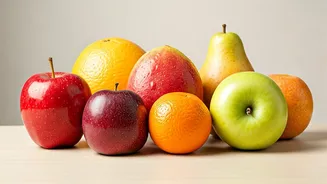Introduction: Sweet Treat
Diabetes management often brings the challenge of balancing dietary restrictions with the enjoyment of food. The misconception that fruits are off-limits
stems from their natural sugar content. However, numerous fruits offer a wealth of nutrients and can be included in a diabetes-friendly diet when consumed in moderation and as part of a balanced meal plan. The key is understanding the glycemic index (GI) and glycemic load (GL) of various fruits, and selecting those that offer both flavor and nutritional value without causing significant blood sugar spikes. This guide highlights seven fruits that are surprisingly good for people with diabetes, presenting their benefits and practical ways to include them in your daily meals.
Berries: Bursting Flavors
Berries, including blueberries, strawberries, raspberries, and blackberries, are excellent choices for people with diabetes. They are packed with antioxidants, fiber, and vitamins, while being relatively low in carbohydrates. Blueberries, for instance, are known for their high antioxidant content, which helps to combat inflammation and protect cells. Strawberries are rich in vitamin C and fiber, contributing to overall health and satiety. Raspberries and blackberries provide similar benefits, with fiber aiding in blood sugar control and promoting digestive health. When consumed in appropriate portions, berries can be enjoyed as snacks, added to breakfast cereals, or incorporated into desserts. The fiber content in berries slows down the absorption of sugar, helping to prevent sharp rises in blood glucose levels. Furthermore, the antioxidants in berries are beneficial for overall health, potentially reducing the risk of complications associated with diabetes.
Cherries: Sweet and Nutritious
Cherries, particularly tart cherries, are another fruit that can be enjoyed in moderation by people with diabetes. They are a good source of fiber, vitamins, and antioxidants. Tart cherries have a relatively lower GI compared to other varieties and contain compounds that may help improve insulin sensitivity. The fiber in cherries contributes to slower sugar absorption, minimizing blood sugar spikes. In addition, cherries are known for their anti-inflammatory properties, which can be beneficial for overall health. Consuming cherries, especially tart ones, as part of a balanced meal can offer a sweet treat without significantly impacting blood sugar levels. They can be enjoyed fresh, frozen, or added to smoothies, providing both flavor and nutritional benefits. The key is to monitor portion sizes and incorporate them into a diabetes-friendly meal plan.
Apples: Fiber Powerhouse
Apples are a fiber-rich fruit that can be included in a diabetes-friendly diet. They have a moderate GI, but their high fiber content helps to slow down the absorption of sugar, preventing rapid spikes in blood glucose. Apples contain both soluble and insoluble fiber, which contribute to digestive health and blood sugar control. Soluble fiber helps to lower cholesterol levels and regulates blood sugar, while insoluble fiber promotes regularity. Eating apples with the skin on provides the most fiber and nutrients. Apples can be consumed as snacks, sliced and added to salads, or incorporated into various recipes. When choosing apples, it’s advisable to opt for varieties that are lower in sugar and to monitor portion sizes. The fiber content of apples makes them a valuable addition to a balanced diabetes-friendly diet, offering both taste and health benefits.
Pears: Similar Benefits
Pears, similar to apples, are a good source of fiber and can be included in a diabetes-friendly diet when consumed in moderation. They have a moderate GI, but their high fiber content assists in slowing down the absorption of sugar. Pears also provide vitamins and antioxidants. Eating pears with the skin on maximizes the fiber intake. They can be eaten as snacks, or added to salads and desserts. When including pears in your diet, it's wise to select lower-sugar varieties and keep an eye on portion sizes. The fiber content in pears supports blood sugar control and digestive health, making them a nutritious choice. Including pears as part of a well-rounded diet can offer both a satisfying treat and health advantages.
Citrus Fruits: Vitamin C Boost
Citrus fruits, such as oranges and grapefruits, are rich in vitamin C and fiber, making them suitable for people with diabetes. They have a moderate GI and contain beneficial compounds that may help improve insulin sensitivity. Oranges offer a good source of vitamin C and fiber. Grapefruits, though slightly more acidic, also have a low GI and can be included in a diabetic diet. Consuming citrus fruits can provide a refreshing snack or be added to salads and beverages. It's beneficial to consume them in moderation, keeping an eye on portion sizes. The vitamin C content supports overall health, while the fiber content helps in managing blood sugar levels. Citrus fruits offer a flavorful way to incorporate essential nutrients into a diabetes-friendly eating plan.
Kiwi: Unique Nutrients
Kiwis are a nutritional powerhouse that can be beneficial for people with diabetes. They are rich in vitamin C, vitamin K, fiber, and antioxidants, while having a relatively low GI. The fiber in kiwis helps to regulate blood sugar levels, while the antioxidants support overall health. Kiwis also contain unique enzymes that aid in digestion. Eating kiwis with the skin on (if desired and thoroughly washed) provides even more fiber. They can be enjoyed as a snack, added to smoothies, or incorporated into various meals. The combination of nutrients and low GI makes kiwis a favorable addition to a diabetes-friendly diet. They provide both flavor and health benefits, supporting overall well-being.












